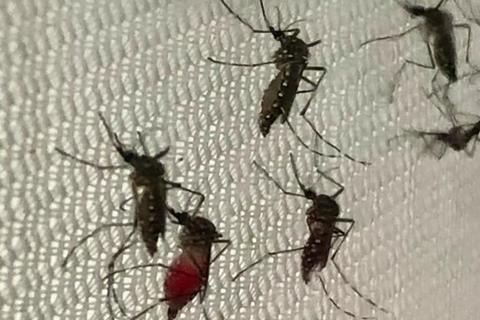Mosquitoes that receive microbiome transplants respond differently depending on whether the donor was wild or lab-reared, a new study has revealed.
The results could help pave the way to discovering whether tinkering with the mosquito microbiome could make it less likely to spread pathogens to humans.

Gene expression proved to be different depending on whether the donor was a field collected mosquito or a lab-reared mosquito, probably because microbiomes isolated from mosquitoes from the field have far more diverse bacteria compared to those in the lab, according to the study by researchers at Liverpool School of Tropical Medicine.
Mosquito traits
Meanwhile, the transplant process itself had minimal impact on gene expression in the recipient host, revealed the paper, entitled ‘Aedes aegypti gut transcriptomes respond differently to microbiome transplants from field-caught or laboratory-reared mosquitoes’, which has recently been accepted for publication by Environmental Microbiology, and Applied Microbiology International publication.
“The microbiome affects many traits in mosquitoes, and many of these can influence how mosquitoes transmit pathogens to humans,” explained corresponding author Dr Grant Hughes.
“However, microbiomes vary from mosquito to mosquito and between locations, and we have a poor understanding regarding how a mosquito responds to different microbes.
Transplanting microbiomes
“By transplanting different microbiomes into mosquitoes we were able to see how the mosquito responded. We were also able to address how our new microbiome transplantation approach affected the mosquito.
“We saw that mosquitoes respond differently, in terms of their gene expression, when they receive a microbiome extracted from a field-collected mosquito compared to a lab-reared mosquito, most likely as the microbiomes isolated from mosquitoes from the field have far more diverse bacteria compared to those in the lab. We also showed the transfer process itself has minimal effect on gene expression in the recipient host.”
The researchers transplanted microbiomes from a range of different mosquito species that were either reared in the lab or caught in the field into Aedes aegypti mosquitoes to see how they turned genes on and off in response to these different microbiomes.
Gene expression
“To answer the first question – ‘How does the microbiome transplant process itself alter gene expression in the mosquito’ - we transplanted microbiomes isolated from four donor species (two Aedes, a Culex and an Anopheles mosquito) into Ae. aegypti larvae that had no microbiome, and compared the gene expression in these groups that were given a transplanted microbiome to mosquitoes which were reared normally (and therefore acquired their microbiome naturally) as a no-transplant control,” Dr Hughes said.
“We then looked for genes that were commonly changed by all four transplanted microbiome groups compared to the no transplant control and saw relatively few – only 71! This suggested to us that the microbiome transplant approach doesn’t impact the mosquito much. This is great as it means we can use this transplantation approach to examine the biology between the microbiome and the mosquito host.”
Lab or field
The next question asked was how different microbiomes from different species and environments alter transcription in the mosquito.
“The most striking influence on mosquito transcription was the environment – if microbiomes were sourced from the lab or from the field,” Dr Hughes said.
“When the recipient mosquitoes (the ones that got the microbiome) received a microbiome from other mosquito species reared in the same lab, the effects were subtle, but if the microbiome came from the field, we saw that more genes were altered.
The researchers were surprised to find that so few genes were altered by the transplantation process.
Microbiome assembly
“Considering how the transplant is done, which is that the eggs are sterilised and then the germ-free one-day-old hatched larvae are inoculated with a ‘donor’ microbiome by transferring the microbiome to the larval water, it’s a similar process to how microbiome assembly would normally take place in that young larvae would acquire their microbiome from the larval water,” Dr Hughes said.
“There are now more exciting questions to address. We can examine how different microbiomes, or compositions of microbes, induce these changes in the host. Is it the composition of the microbiome? The diversity? These are questions that we are interested in.
Vector control
“Understanding these types of questions may explain how microbes influence the mosquito’s ability to transmit pathogens and an understanding of this could be exploited for novel microbial vector control approaches.
“The next steps would be to look into how these different microbiomes affect processes in the mosquito such as how mosquitoes transmit pathogens to humans. Our work here provides mechanistic avenues in the mosquito host to examine which could be responsible for these phenotypes.”
‘Aedes aegypti gut transcriptomes respond differently to microbiome transplants from field-caught or laboratory-reared mosquitoes’ is published in Environmental Microbiology, an Applied Microbiology International publication.







No comments yet